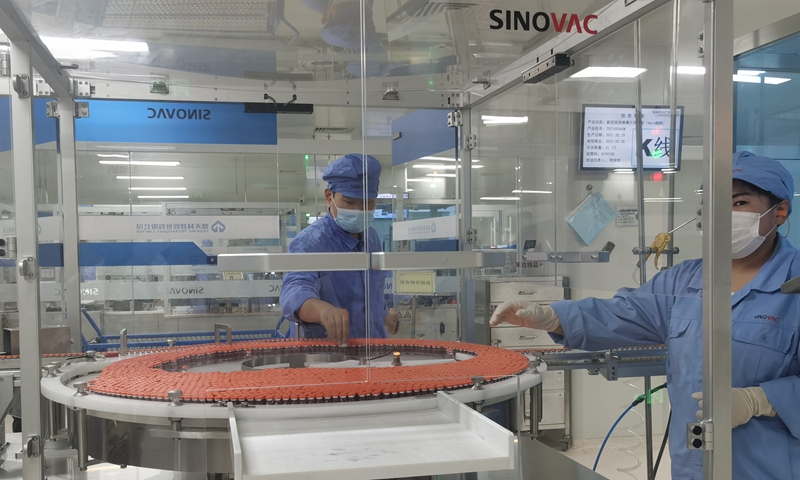
Sinovac staff members on COVID-19 production line Photo: Hu Yuwei/GT
Editor's note: Some countries and regions in the world have been exploring resuming international exchanges as they have vaccinated a certain percentage of their population. For example, China has been negotiating with some partners to mutually recognize health certification for travelers. Seven EU countries have launched a digital vaccine passport system to allow their residents to move freely across the bloc. The US has also eased travel recommendations for more than 110 countries and territories, including Japan ahead of the upcoming Olympics.
Vaccine passports appear to be desirable, as many governments think the system can secure a safe reopening due to more people getting vaccinated against COVID-19.
However, will things move as anticipated if we only rely on vaccination for reopening? What are the preconditions for issuing vaccine passports and what should we do after the mechanism is launched? Lei Ruipeng, an expert at the School of Philosophy and Center for Bioethics at Wuhan-based Huazhong University of Science and Technology, and a member of the WHO Ethics and COVID-19 Working Group, answered these questions in an exclusive interview with the Global Times.

Photo: Courtesy of Lei Ruipeng
Q1. What is a vaccine passport? What is the difference between a vaccine passport and the health code that China requires from international arrivals?
Lei: According to the definition of the WHO, an immunity passport, or immunity certificate, is proof that some governments issue to people to prove that they have accepted vaccination and have immunity. People holding the certificates can be waived from anti-epidemic measures of the issuing countries.
If the governments have joined in any international agreements or the immunity triggered by the vaccines are recognized by the WHO, immunity passport holders from these countries can be allowed to travel freely within all the members participating in the agreements without being required to take nucleic acid tests or quarantining.
Unlike immunity passports, the health code is an effective public health managing measure used in China's anti-epidemic battle based on technology to record dynamic information amount personal health, including normal respiratory symptoms and nucleic acid test results. But immunity passports are certificates to prove the duration of individuals' immunity, and there is not yet enough evidence to demonstrate the protection and duration of immunity against COVID-19 from vaccination.
Some governments have suggested the idea of immunity passports as a precondition to restart less restrictive travel in the post-pandemic era. However strategy and specifics which are needed to be put in place before resuming international exchanges could not relit on immunity passports alone. Both inoculation and certain health public measures are necessary. A hasty launch of immunity passports when the COVID-19 pandemic is not under control could lead to a new round of international transmission of the virus, similar to what happened at the beginning of the pandemic as some governments relaxed anti-epidemic measures when just reaching a preliminary but discontinuous control over their own domestic epidemic situation.
Q2. What are the preconditions for countries facing a different epidemic situation, using different anti-epidemic measures and vaccines to reach mutual recognition over each others' vaccination results and issuing vaccine passports to each others' residents?
Lei: The WHO has released their considerations of scientific and ethical preconditions to issue immunity passports, based on which I think the international community has not agreed on proper timing to launch the mechanism globally.
But it is possible that some countries or regions can build bilateral or multilateral committees to reach mutual vaccine recognition and issue immunity passports to each others' residents under the guidance and standards of the WHO.
Q3. Europe and the US have been promoting some measures to resume international exchanges, including accepting vaccinated international arrivals without conditions. Do you think now is the right time for them to do so, given the current epidemic situation in these regions?
Lei: Europe and the US have been witnessing an easing epidemic alongside mass vaccination, but there are still many unsolved problems before they can issue immunity passports to each other. For example, some European countries and the US did not perform ideally in their battle against the epidemic and they still lack some necessary anti-epidemic public health facilities and measures. No conclusion has been reached over antibody-dependent enhancement and immunity escape of COVID-19 vaccines.
The WHO has proposed scientific conditions for issuing immunity passports:
1. The extent of protection conferred by antibody-mediated and cell-mediated immune responses to SARS-CoV-2 must be understood;
2. The minimum length of immunity against SARS-CoV-2 must be established and its duration monitored over time;
3. Tests that can identify individuals who are immune must be available.
There are also ethical considerations that have to be taken into account before issuing immunity passports, including whether the passports could cause harm or an infringement of rights for people who do not hold the passports.
Currently, I think it will not work to allow vaccinated travelers to move unconditionally as vaccination does not necessarily introduce antibodies and antibodies do not necessarily build immunity. Moreover, there have been reports of people who got infected despite being vaccinated and it is still unclear whether re-infection could lead to human-to-human transmission. So, such a move would bring about huge risks when there is a lack of scientific evidence and a sufficient vaccination rate to support the move at the moment.
Q4. The WHO have said that they do not recommend requiring vaccination proof for international travel. As a member of the WHO Ethics and COVID-19 Working Group, what do you think about the potential problems of vaccine passports?
Lei: The WHO has noted on many occasions that scientific and ethical conditions have not been met currently for launching immunity passports. The WHO Ethics and COVID-19 Working Group has outlined ethical guidelines for the immunity passports after months of discussion, in which I have participated since February, 2020.
I fully agreed with the WHO's principle and stance on the issue. Immunity passports are scientifically necessary and ethically acceptable only after preconditions outlined by the WHO are met. Under these circumstances, immunity passports can be issued as a measure to reduce the number of people subject to restrictions.
Meanwhile, measures should also be taken to protect those who have not obtained the passports.
But some ethical concerns still deserve attention:
1. Unfairness could occur if individuals are subject to different management measures due to different status of immunity;
2. Immunity passports should not be used as a decisive basis for personal or certain groups' freedom and legitimate rights if other restrictive measures such as wearing masks, social distancing and hand hygiene could also effectively reduce infection risk;
3. Different treatments for different individuals should match the infection risk they are facing. The cost of restrictive measures to individuals should not surpass the potential benefit to public health;
4. Governments issuing immunity passports should provide enough support to individuals who have to be put under quarantine or keep social distancing as they have not obtained the passports.
In addition, if vaccine passports are applied globally, attention should also be paid to the following issues: potential harm from fake negative or fake positive results; possible encouragement of wrong activities like deliberately getting infected to obtain the passport or faking immunity passports; unfairness due to unbalanced accessibility to vaccines; the cost of issuing the passports.
Q5. What is your expectation for a proper vaccine passport mechanism? If China is going to launch vaccine passports, how should the country adjust its anti-epidemic measures?
Lei: I suggest the WHO can establish a science and ethics expert committee on the issue and regularly review and discuss scientific and ethical standards for the vaccine passports. The committee can also tailor their advice and guidance for applications in different countries and regions and discuss implementation measures and steps with these countries and regions.
In countries where conditions are ripe, bilateral or multilateral science and ethics committees could be set up and could issue vaccine passports based on WHO guidance and the scientific evidence.
For a populous country like China, it is especially difficult to vaccinate the whole population or adjust anti-epidemic measures. For countries and regions where the virus is still spreading, they can judge whether herd immunity has been built based on the vaccination rate and person-to-person transmission.
But China has long since got the epidemic under control, so we could not use virus transmission among the population as a criterion. The most important thing is to complete vaccination.
Hopefully a large percentage of China's population can complete their inoculation procedure and build immunity against COVID-19 by the end of this year, following which China can start issuing immunity passports and promote mutual recognition of the passports with the international community.
For potential challenges alongside the move, the following measures can be considered: adding vaccination status to Chinese residents' health certification [health codes] and use the certification as an immunity passport; signing agreements with other countries and regions to let these countries and regions recognize China's health certification; with immunity passports for international arrivals, require them to apply for an international version of the health certification, which should contain information about their health and vaccination status and travel history before coming to China, and accept fast nucleic acid and anti-body tests on arrival and receive test results within hours. Once mutual recognition of immunity passport is reached, restrictive measures for international arrivals will be relaxed.



